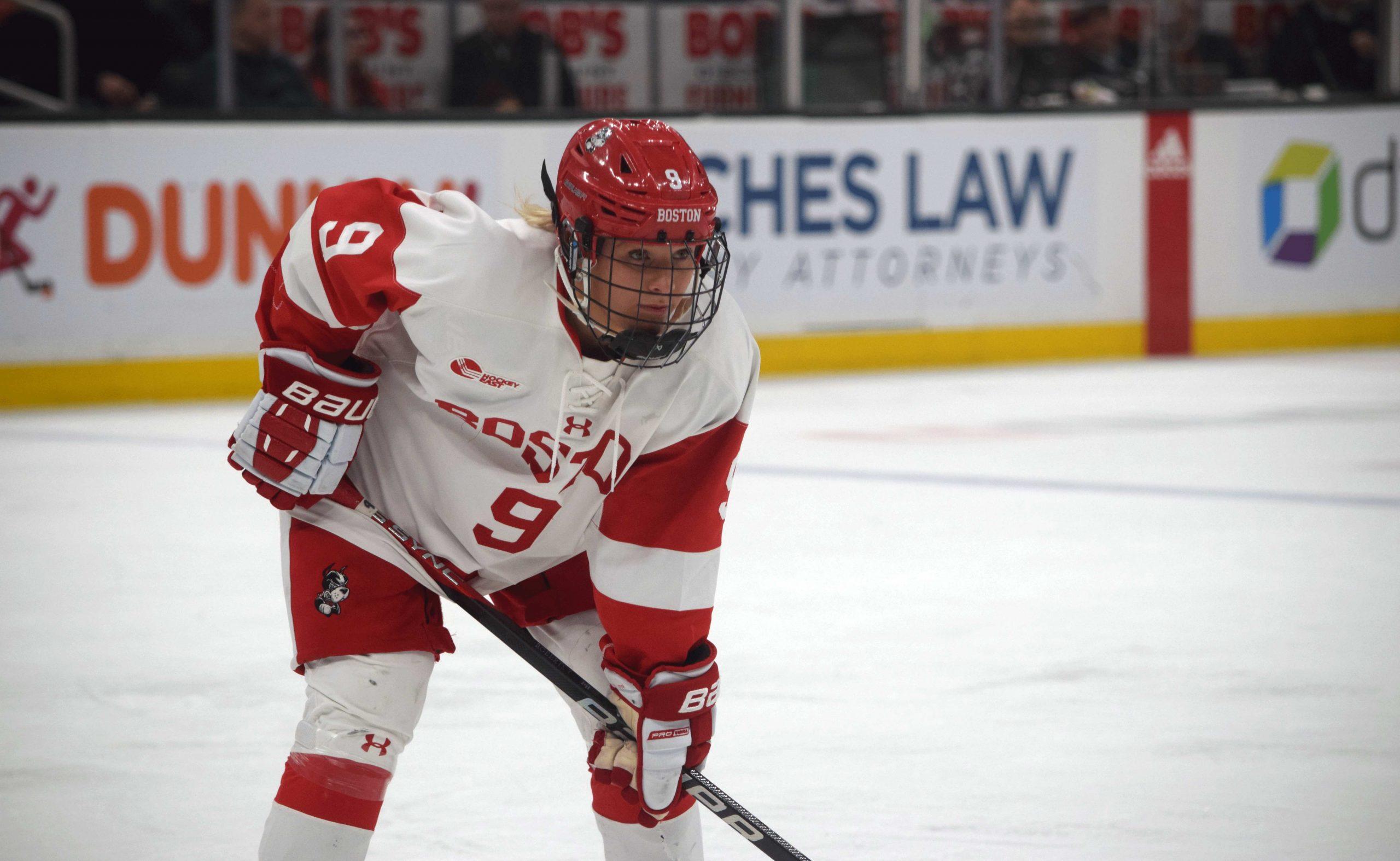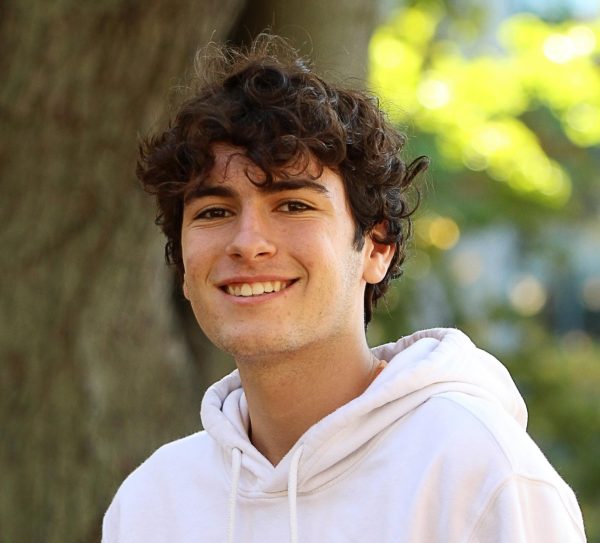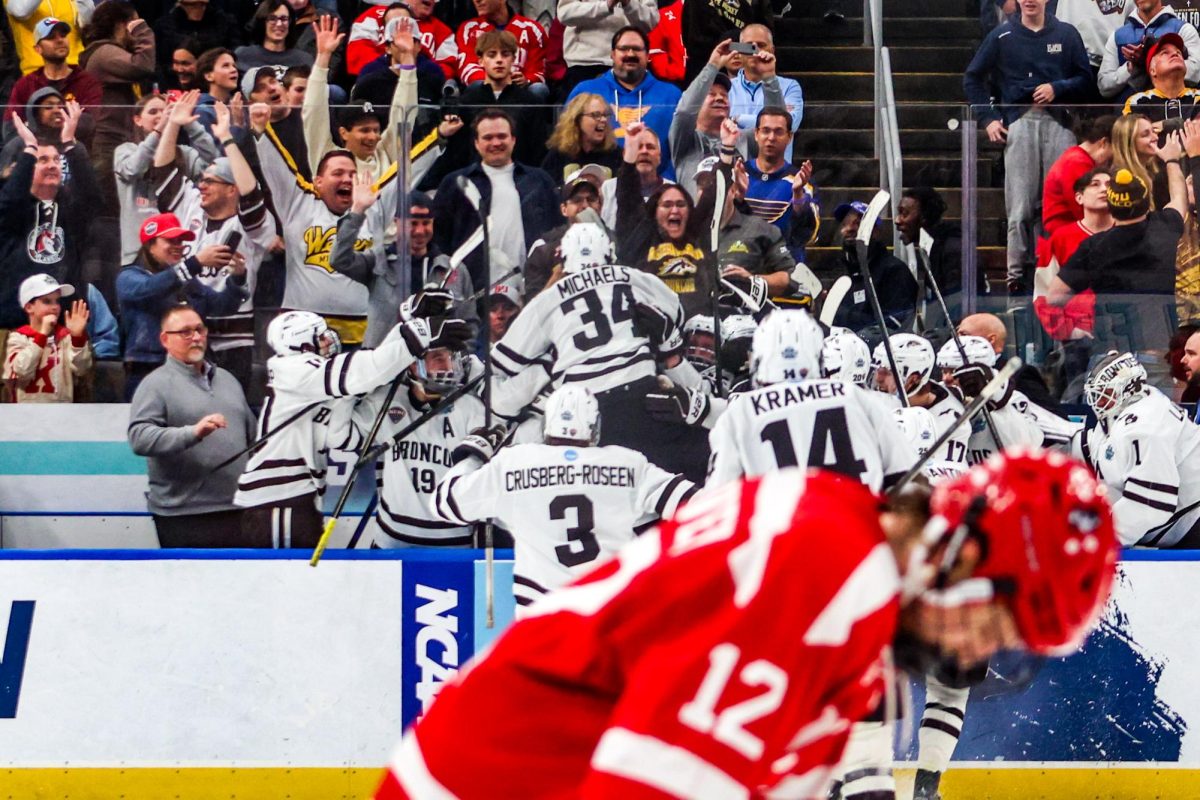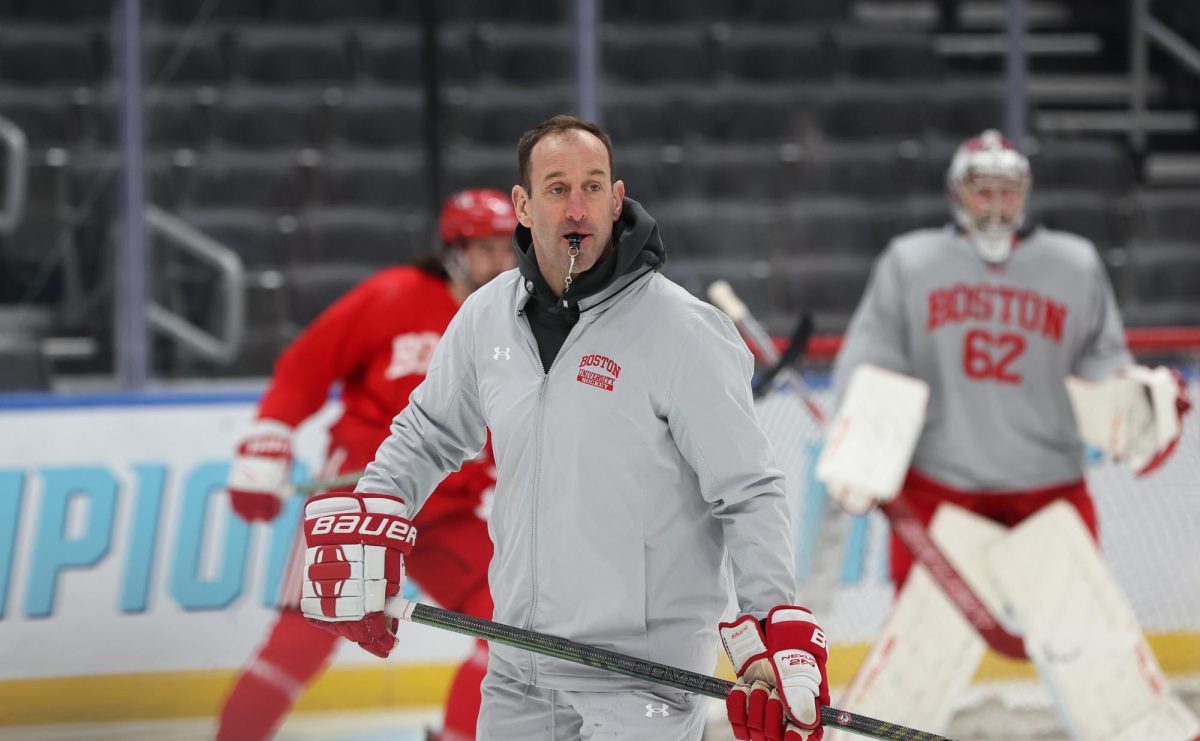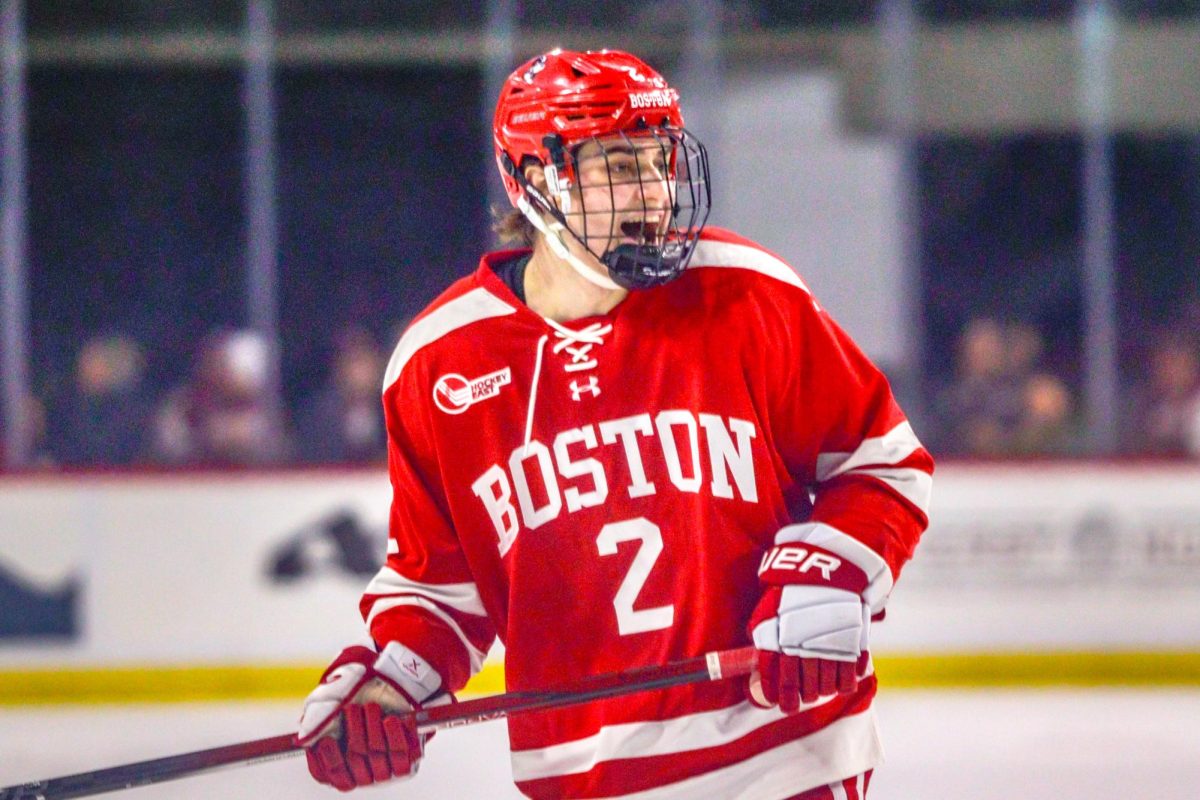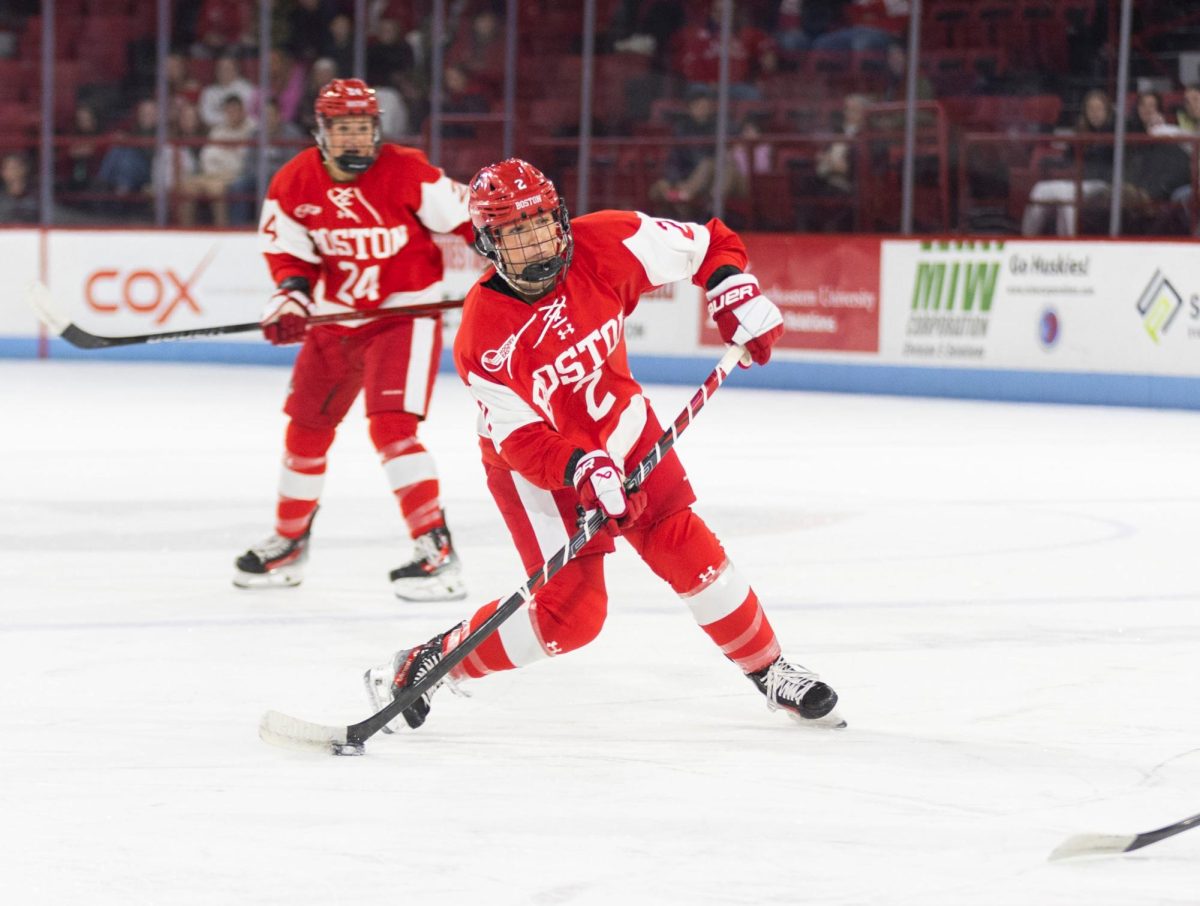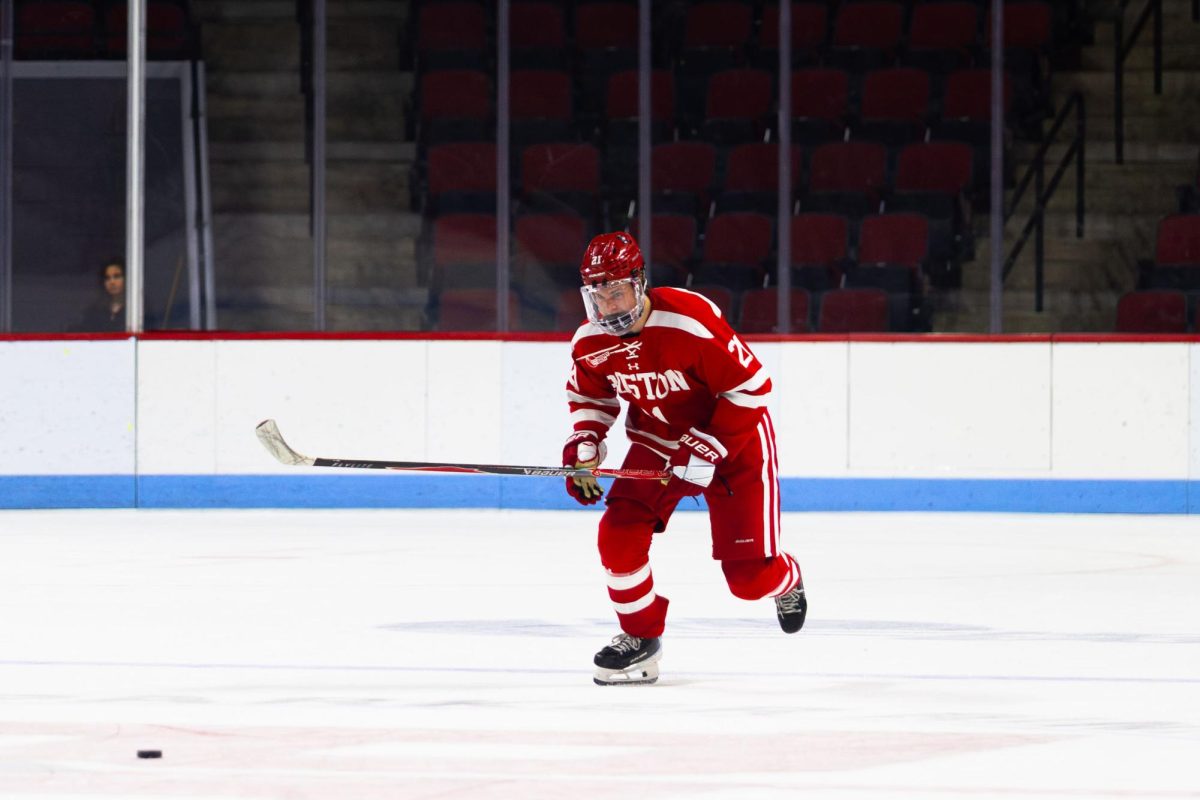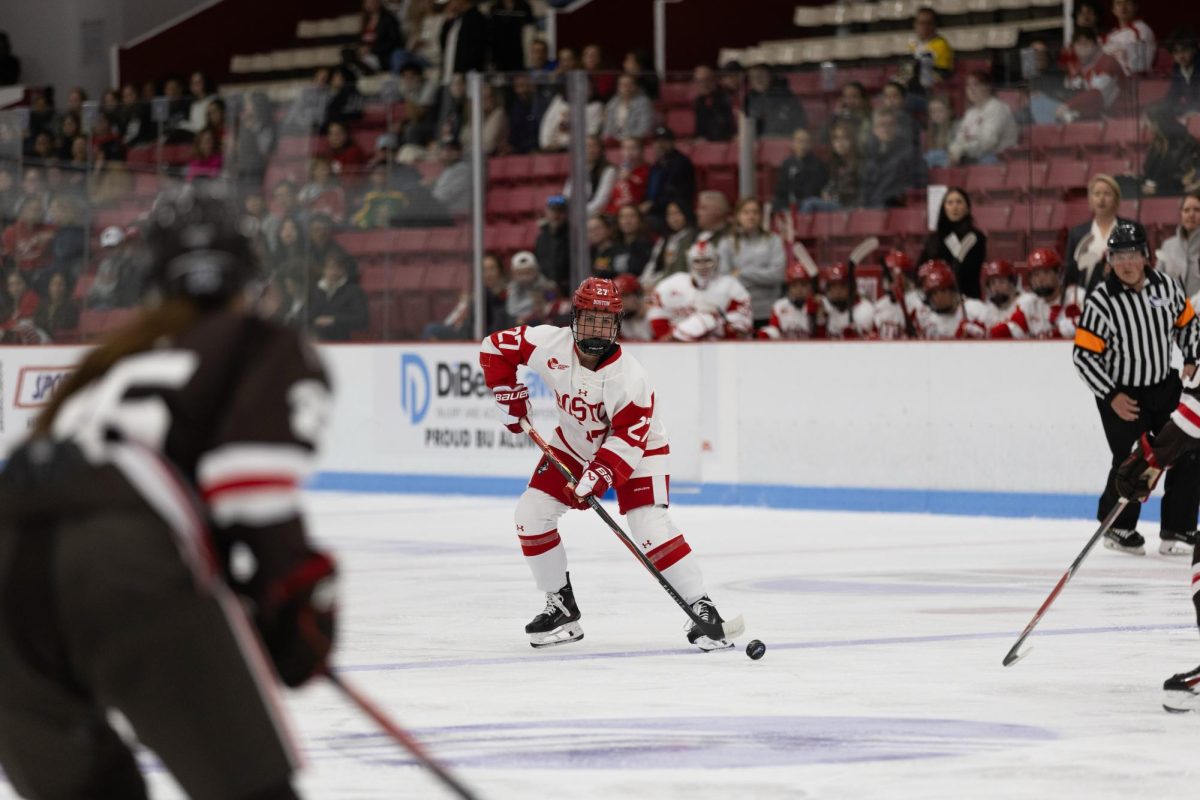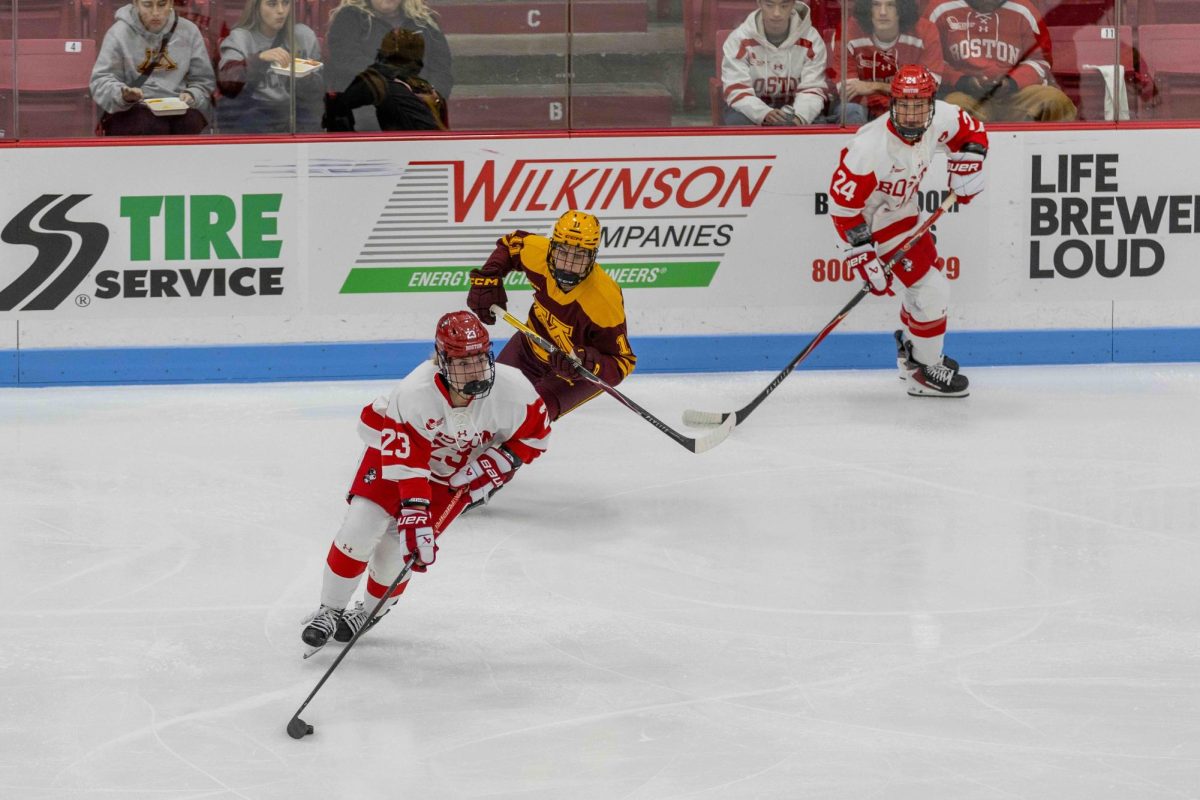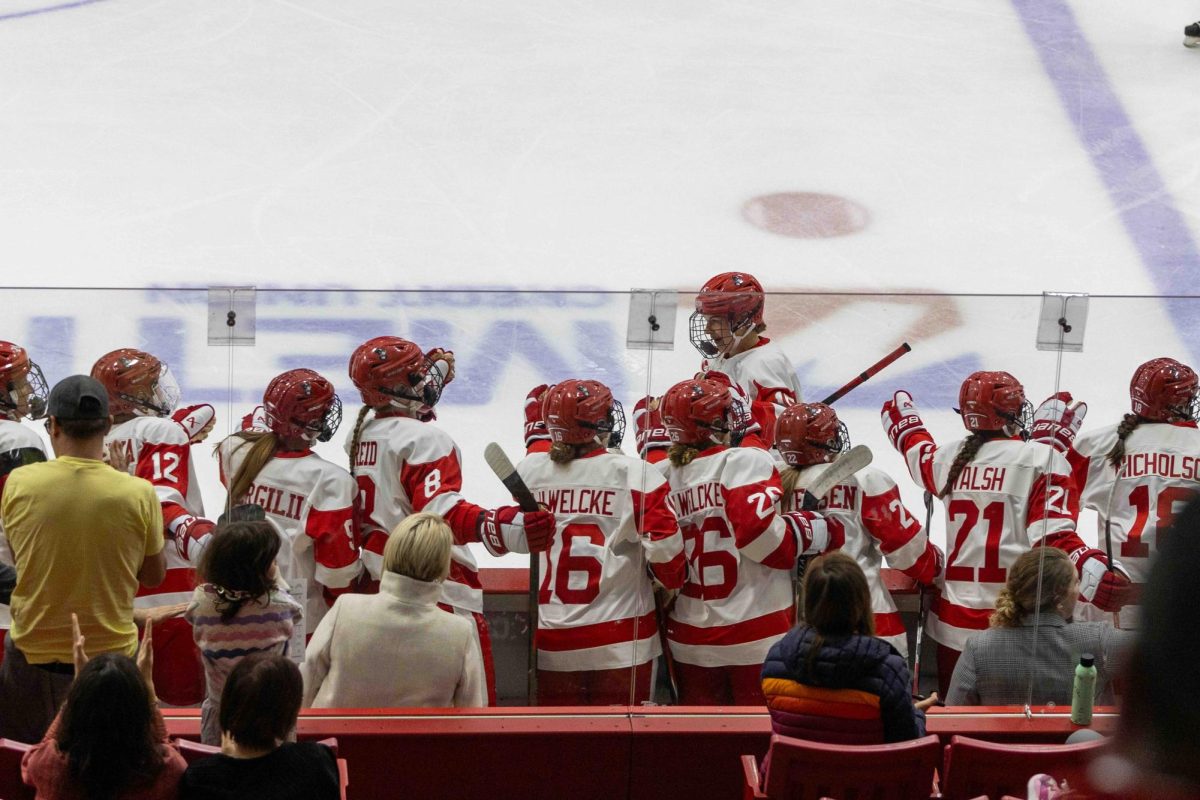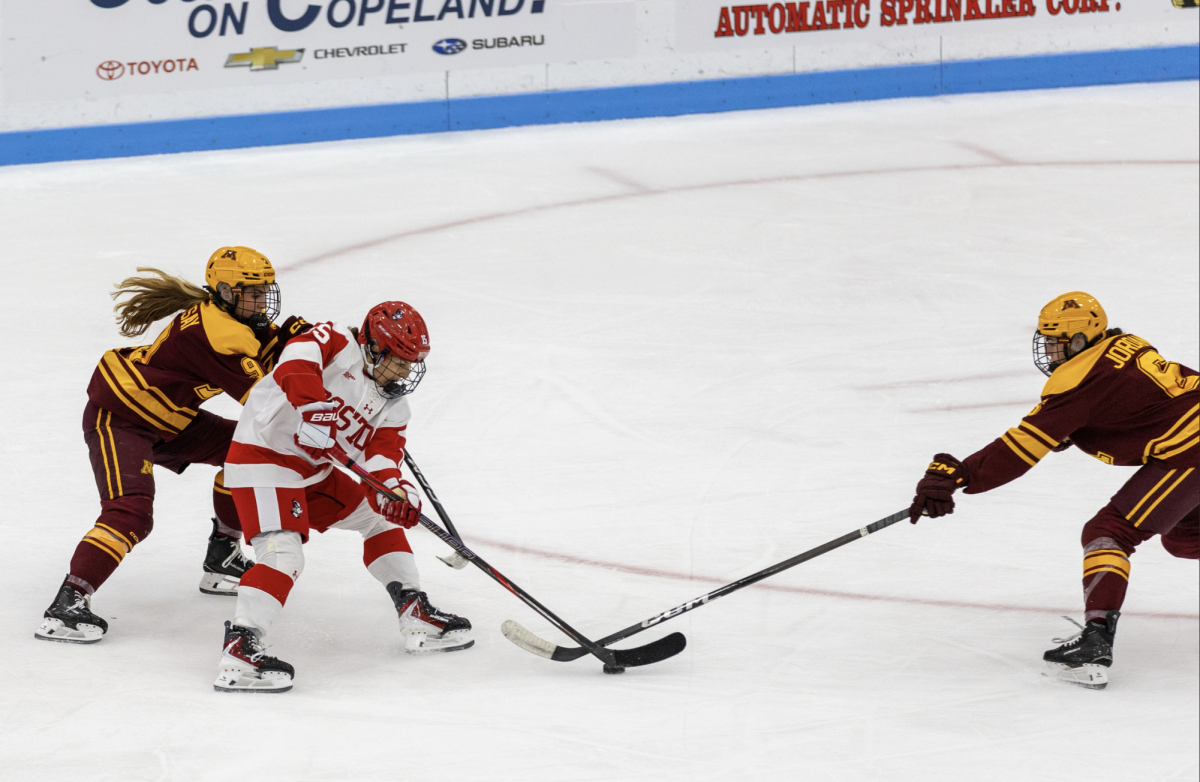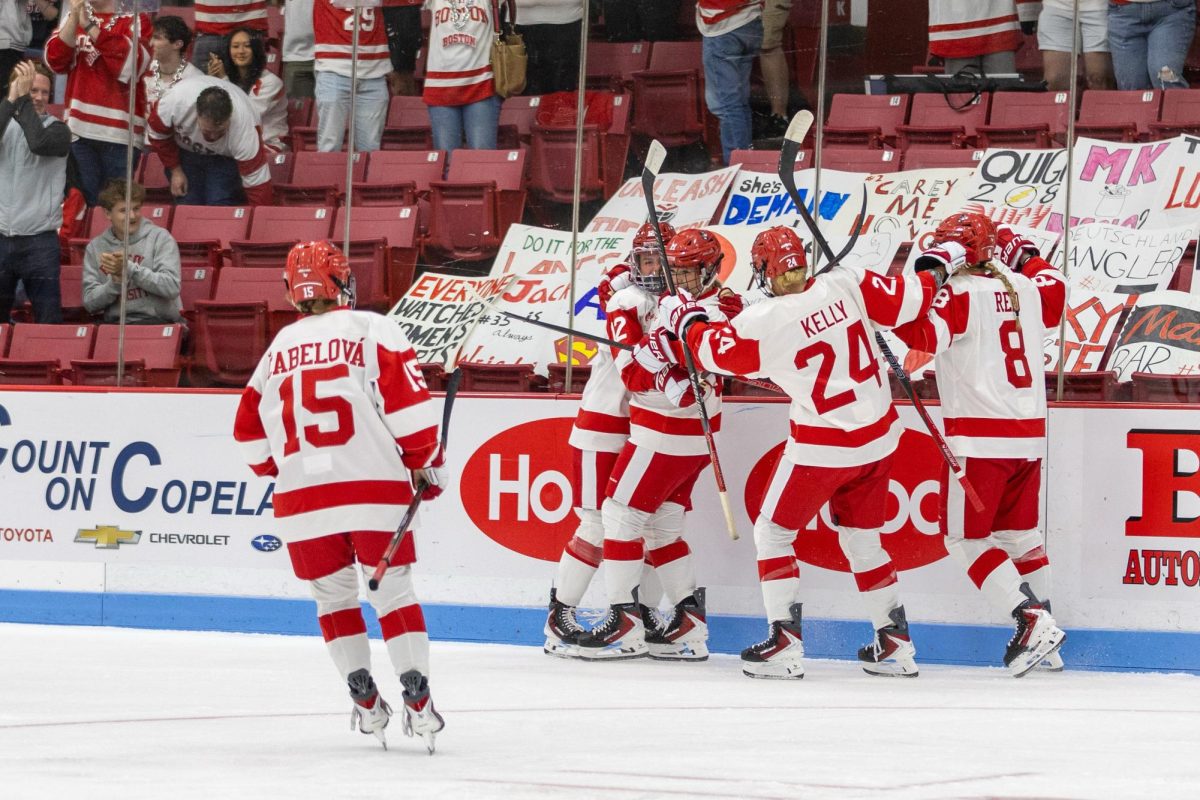At the core of what Alex Law is doing is a fairly important question. Why?
She’s one of the best young hockey players in Canada, the biggest hockey nation on earth. A two-time U18 World Champion in that nation’s colors, one of those gold medals earned as an assistant captain and critical point scorer. A former prized recruit. And now, going into her sophomore year at BU, one of the NCAA’s most intriguing offensive players in a sport she’s played since she was four years old.
In hockey, Alex Law’s got potential. A lot of it.
“It is so unique,” BU women’s hockey head coach Tara Watchorn says, “how she can handle a puck.”
And yet, here Law is. Dedicating so much of her time to something else. Willingly dumping the endless schematic intricacies of two sports on her plate. Sacrificing so much of an offseason meant to give her body a chance to recover, and in doing so, no doubt increasing the risk of injury.
“It’s already hard enough doing one,” women’s hockey senior Liv Haag says.
And Law is doing two.
All to continue playing lacrosse, a sport she can’t play professionally, at BU.
So back to that question. Why?
Law seems to barely even understand the inquiry. “I’m not about to just give one of them up,” she says.
***
It’s important to understand: Law is a damn good lacrosse player. This past summer, she made Canada’s U20 national team, and at the World Championships in Hong Kong, she scored seven goals and dished out two assists as Canada won a silver medal. She was recruited by schools in the Big Ten and ACC — two of the powerhouse conferences in women’s lacrosse. If it weren’t for hockey, she might be playing there.
“We on the lacrosse side got really lucky in all this,” BU women’s lacrosse head coach Lauren Morton says. “She’s really a high level player in both.”
So for Law and her family, it’s simple math.
Law wants to make the Olympics, whatever the sport. She is not shy about it. It’s a huge aspiration for her. “Representing your country is huge,” Nancy Lewis, Law’s mother and a former soccer player at the University of Toronto, says. “Wearing your flag? That’s a big, big thing.” Hockey is already an Olympic sport, but with 6v6 lacrosse returning to the Olympics in Los Angeles in four years, continuing to play lacrosse at BU is suddenly another path to achieving that goal. And as a player already in Lacrosse Canada’s junior ranks, she’s got a legit shot at the team. “A very realistic possibility,” Morton says.
And two paths to the Olympics, of course, is greater than one.
Obviously, it’s more complicated than that. Playing both is no doubt hard on Law’s body — she admits that taking care of herself and allowing her body to recover is something she wants to get better at — and a dislocated shoulder that caused her to sit out her entire freshman lacrosse season heightens that concern. More generally, conventional wisdom suggests that putting one foot in each door weakens Law’s overall chances in both.
But none of this has ever been conventional.
At the urging of some of her friends, Law picked up lacrosse at age 11. It became the fourth sport she was participating in at an organized, competitive level. She had started playing hockey at age four; soon after, she was also playing co-ed soccer and participating in cross country, running against kids two grades older. When there was outside pressure to commit to one sport when Law was 11, Lewis and her husband, James Law, fought for Law to continue playing all four, banding together with some of Law’s hockey and soccer teammates to create a modified schedule that accommodated both sports. At age 13, with conflicting tournaments and provincial camps in hockey proving to be too much, Law finally dropped soccer, but continued — and excelled — in the other three through high school.
“We were letting down the soccer team,” Lewis jokes.
Around the time she dropped soccer, Law started receiving emails from college hockey coaches. They were interested, and some even wanted a commitment. Law was sold. “I was wanting to commit,” she says. Lewis wouldn’t let her, adamant she should stay patient and continue pursuing lacrosse as well.
I ask Lewis why she felt that way, and she says that playing multiple sports actually eased the pressure on Law. Committing to just one, she says, leads to the kind of toxic obsession that can damage a young athlete. “The pressure on kids these days,” Lewis laments, “you know, ‘I gotta be on the ice 24/7, I gotta do skills in the summer, I’ve got to be the best I can be to compete.’”
“It was like, ‘You know what? You need a breather. You need a break,” she says.
Lewis, it should be noted, was inducted into UToronto’s athletics Hall of Fame in 2011. She knew what she was doing.
Still, it doesn’t change the fact that, in a quest to give her kid a break, she was encouraging Law to play another sport.
But it worked. There was a ‘blackout period’ from April of Grade 8 to June of Grade 10, when college hockey coaches couldn’t make contact with Law. By the time it was over, Law had made up her mind. “I just decided I wanted to go for lacrosse, too,” she says.
***
There’s more to it than just the Olympics.
Law is an athlete through and through. Law loves the competitiveness and the physicality — the word “gritty” comes up regarding Law constantly. She loves gamedays, loves the general social camaraderie of a team and loves the opportunity to show off her talent.
Clearly, it’s hard to give any of that up, even if only for the spring season.
And there are certainly benefits to playing both sports. Hockey and lacrosse translate. The stick work piece is obvious, but Morton explains that hockey teaches players to play with their head up. Hockey is an aggressive and physical game, while lacrosse is about athleticism and pace, and each of those qualities give her a unique edge in the other sport.
“A player like Alex, it challenges me,” Watchorn, the head women’s hockey coach at BU, says. “Like, how do we keep all of those unique, dynamic skills that she has from playing both sports, but also help her grow?”
Her first hockey season on Comm. Ave. was spent in the shadow of upperclassmen and somewhat derailed by the dislocated shoulder suffered late in the year, but Law still flashed, finishing with nine assists and four goals. With many of those upperclassmen lost to the portal in the offseason, Law will have plenty of opportunities as a sophomore. “She’s going to be a big part of our lineup,” Watchorn says.
Law redshirted lacrosse last year, and on large college lacrosse rosters, significant minutes are not necessarily guaranteed. But Morton doesn’t hesitate.
“Absolutely,” she says when asked if Law will get legit playing time as a sophomore. “Without a doubt.”
So Law is going to do it. For real this time. Barring injury, she will play hockey and lacrosse, back-to-back, in the same year, at the NCAA D1 level. She’ll be with the hockey team until March, then she’ll join the lacrosse team for the start of its spring season — unless, of course, the hockey team makes a postseason run into March and April. She won’t be with both teams at once, but each sport will be a presence during the other’s season. “She’s not only a hockey rat,” Morton says. “She’s definitely a ‘lax’ rat.” Also, not for nothing: there’s the academics.
It won’t be for the faint of heart, to say the least.
Morton, a BU lacrosse alum and former assistant coach at Duke, admits she’s been around a fair share of dual-sport athletes. But, she says, never one playing a winter sport straight into a spring sport.
There is some precedent for it — Kenzie Kent, a former lacrosse star at powerhouse Boston College, was also on the Eagles’ hockey team and was a team captain her senior year in 2018. She’s now an assistant lacrosse coach at Harvard.
Law, naturally, knows all about her.
“The first time I met [Law],” Morton recalls, “she was like ‘I want to be the Canadian Kenzie Kent.”
But Kent is only a famous outlier. When Watchorn, a former BU hockey star and Olympic gold medalist, is asked about what Law is doing, she says simply: “It’s almost unheard of.”
Because it’s risky. Because it’s a lot. But this is what Law’s been working for her entire life.
And besides, for someone as sport-obsessed as Law, playing two sports instead of one? That just means more games and less offseason. “I always say to our team,” Morton says, “you would much rather be in season and playing games than just practicing all the time.”
“So I think for her,” Morton adds, “it’s just really fun to be able to have two seasons.”
This story is part of the Daily Free Press’ annual Hockey Issue. Copies are available around campus and at the women’s (Oct. 1) and men’s (Oct. 5) home openers.

